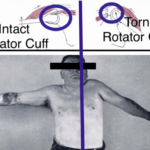Do You Have a Rotator Cuff Tear?

If you’re over the age of 30, there is a greater than 30% chance that you have experienced some form of shoulder discomfort at some point. It’s a shared experience among all individuals, whether it’s a momentary twinge from a sudden pull or a fall, or a persistent, nagging ache that seems to linger. Shoulder pain isn’t limited to athletes; anyone can experience it. Following back pain, shoulder pain stands as the most prevalent musculoskeletal complaint seen by healthcare professionals in the U.S. Over 6 million individuals in the U.S. … Continue Reading








